
Mental Health Is Your Foremost Wealth
Mental health is the most common term that you hear from everyone in your day-to-day life.
But maximum people don’t know what mental health means and what the person has to endure when his/her mental health is not good.
Let's talk about Mental Health in detail by covering these points:
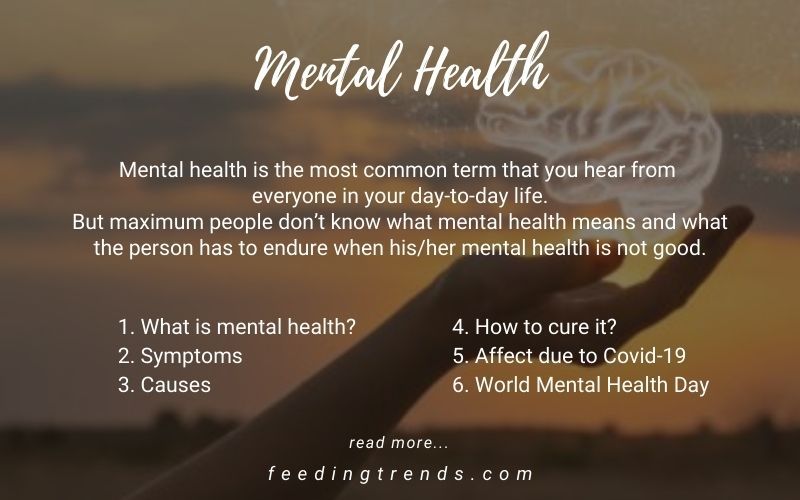
1. What is mental health?
2. Symptoms
3. Causes
4. How to cure it?
5. Affect on it due to Covid-19 and Pandemic.
6. World Mental Health Day
What Is Mental Health?
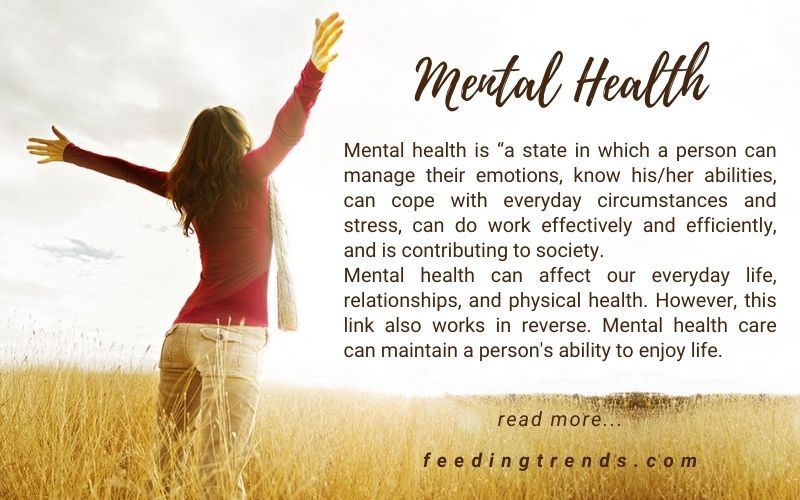
Mental health is “a state in which a person can manage their emotions, know his/her abilities, can cope with everyday circumstances and stress, can do work effectively and efficiently, and is contributing to society.
Mental health can affect our everyday life, relationships, and physical health. However, this link also works in reverse. Mental health care can maintain a person's ability to enjoy life.
The main responsibility of Mental Health Care is to find a balance between life activities, responsibilities, and mental resilience efforts. Conditions such as stress, depression, and anxiety can affect mental health and disrupt everyday life.
The favorite that I follow is “What mental health needs is more sunlight, more candor, and more unashamed conversation.” Glenn Close
This quote says the truth that we all must follow that we should talk about mental health openly without the fear of being judged or without feeling ashamed as this topic needs more awareness.
Mental Health Symptoms:
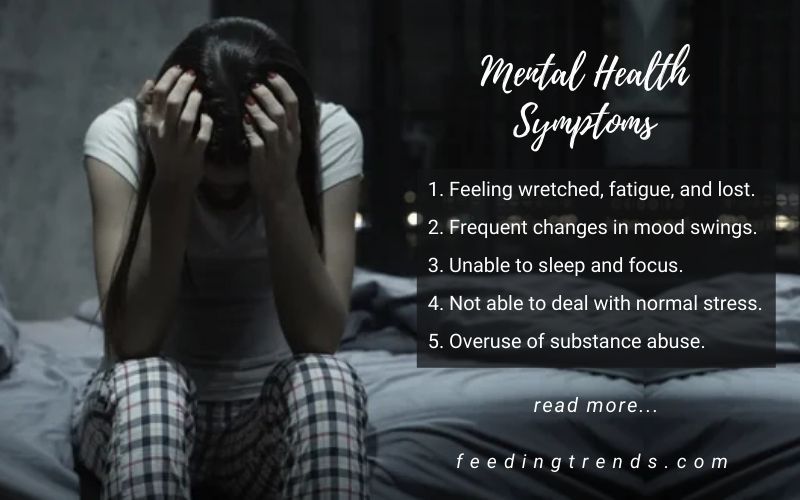
1. Feeling wretched, fatigue, and lost.
2. Frequent changes in mood swings.
3. Unable to sleep and focus.
4. Not able to deal with normal stress.
5. Overuse of substance abuse.
6. Several changes in consumption of food.
7. Always angry, frustrated, and violent.
8. Thinking of self-killing.
9. Withdrawing from social places and events.
10. Isolating and not talking to anyone.
11. Changes in sexual drive.
12. Not able to understand anyone.
13. Excessive worrying or fear
14. Frequent nightmares.
15. Intense fear of weight gain or concern with appearance.
Mental Health Causes:
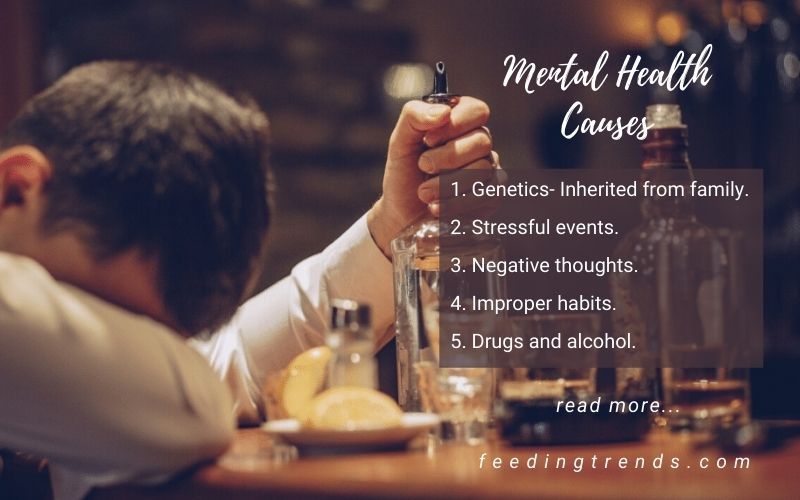
1. Environment- Living in a stressful environment increases the chances of developing mental health problems. Things like living in poverty or having an unsupportive family put stress on your brain.
2. Genetics- Inherited from family.
3. Childhood Experiences- Even if you are living in a healthy environment now, things that happened to you as a child can affect your later life.
4. Stressful events- some tragic accident, loss of your beloved one, etc.
5. Negative thoughts- Low self-esteem, low self-resilient, and low motivation which can lead to depression, anxiety, and panic attack.
6. Improper habits- Irregular sleep or eating habits.
7. Drugs and alcohol- Drug and alcohol abuse can trigger mental illness and make recovery from mental illness difficult.
How to Cure Mental Health?
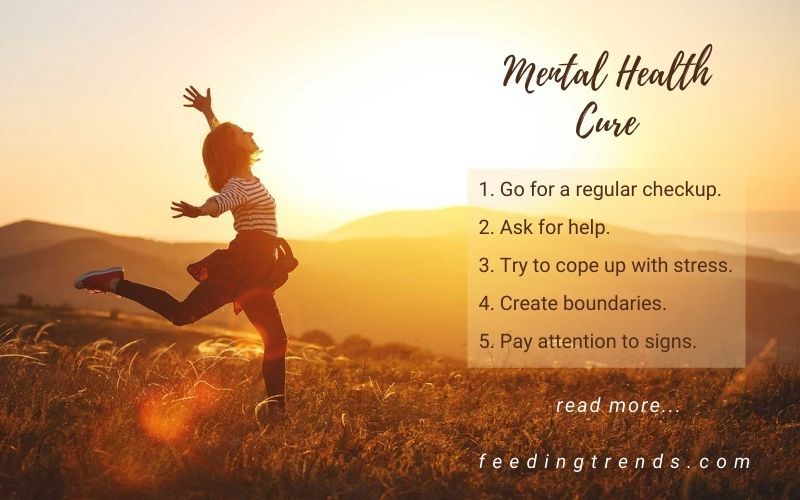
There is no sure way to prevent mental health problems; However, if you have a mental illness, taking measures to manage stress, increase your resilience, and increase self-esteem can help you keep your symptoms under control.
1. Go for a regular checkup- Do not neglect exams and do not skip visits to your doctor, especially if you are not feeling well. You may have a new health problem that needs to be treated, or you may experience side effects from medications.
2. Make sure that you are fine- Getting enough sleep, eating a healthy diet, and participating in regular physical activity are important. Try to keep a regular schedule. Talk to your primary care doctor if you have trouble sleeping or if you have questions about diet and exercise.
3. Ask for help- Mental health problems can be more difficult to treat if symptoms are more critical. Long-term maintenance treatment can also help prevent symptoms from coming back.
4. Pay attention to signs- Work with your doctor or therapist to find out what may be triggering your symptoms. Take the help of your therapist or doctor if you notice any changes in your symptoms or how you are feeling.
5. Try to cope up with stress- Stress is often inevitable, but you must know how to maintain good mental health. Try to manage your responsibilities and concerns by making a list or schedule of where you can resolve each problem. Write down your worries and you will find that they are manageable. Try not to bury your head in the sand and solve problems. Write down the things that stress you out and make sure you can deal with them in the morning.
6. Do more of what makes you happy- lookout for some time to do the things that you enjoy. If you enjoy going for a walk, painting, or watching a particular TV show, try to take the time to have that. If we don't spend time doing things we love, we will become exasperate. Whether you need help getting around or not, check out your favorite things to do section, or head to our Events Calendar, for ideas and information on what's happening in your area.
7. Help someone who is in need- Helping others isn't just good for the people you help; it's good for you too. Helping someone will assist you with your self-esteem and make you feel good. Feeling like a part of society is a very important part of your mental health. You can try volunteering for a local charity or your loved ones.
8. Try and attend social places and engross yourself- Strive to keep up good relationships and talk over with people whenever you get the possibility. Having friends is very important not just for your self-esteem but also to support you when you are not feeling well. Research has shown that interacting with others for ten minutes only can improve memory and cause you to feel contented!
9. Increase school-based interventions- try and increase awareness (targeting children, parents, and education professionals).
10. Create boundaries- It's okay to mention “no” to activities that you just know you do not like or don't desire to try to do anymore. this might include not checking emails at midnight, not attending meetings you do not like, or not answering the phone at certain times of the day.
Affect of covid-19 and pandemic on the mental state
The pandemic has likely resulted in psychological state problems starting from mild, temporary exposure to chronic, progressive, and severely disabling conditions. The psychological state of individuals has been affected in a very worse way because of this covid-19 as people were restricted to travel out of their homes. they need to isolate themselves to shield themselves from this deadly disease. They were unable to satisfy their loved ones which somewhere has caused a significant impact on their psychological state.
Also, the people that were having covid were under stress because they need to endure lots within the matter of health both physically and mentally as they need to form them isolate they can’t are available contact with anyone as this is often a disease.
People were facing financial problems, feeling of loneliness, unable to specialize in their work, children were homebound, people were glued to their screens which have made them lazy, and that they feel fatigued very easily. These problems have been born to psychological state problems like depression, anxiety, stress, etc.
WHO has issued guidelines for countries to take care of basic services, including psychological state services, during COVID19 and recommends countries allocate mental state resources as an integral part of their response and recovery plans. The organization also urges countries to observe changes and interruptions in services so they'll respond if necessary.
World Mental Health Day
10 October is reserved as World Mental Health Day.
The overall objective of World status Day is to lift awareness of status problems around the world and to mobilize efforts in support of the condition.
The Day provides an opportunity for all stakeholders performing on mental state issues to talk regarding their work, and what plenty must be done to make mental state care a reality for people worldwide.
The campaign slogan for World Mental Health Day 2021 is,
“Mental health look after all: let’s make it a reality”
#WorldMentalHealthDay
The COVID19 pandemic had hit hard on people's psychological states. Health care workers and other frontline workers, students, people living alone, and folks with pre-existing mental illnesses are being particularly affected.
Yet there is also a reason for optimism. During the globe Health Assembly in May 2021, governments from around the sector identified the want to rescale first-class intellectual fitness offerings in any respect level. And some nations have observed new approaches to imparting intellectual fitness care to their populations.
During this year’s World psychological state Day campaign, we can exhibit the efforts made in an exceedingly number of these nations and encourage you to spotlight fine memories as an element of your activities, as a proposal to others.
Just as good condition helps our bodies stay strong, mental fitness helps us achieve and maintain a decent mental state. After we are mentally healthy, we show pride in our life, the environment, and also those who are a component of it.
We can be creative, explore new skills, try new things, and take risks. We are better able to address difficult times in our personal and vocation.
Forward and luxuriate in life again!
Tell us how useful this text was for you below within the comments.
Don’t forget to love and share this necessary information with your loved ones!
Read more:
Appreciate the creator